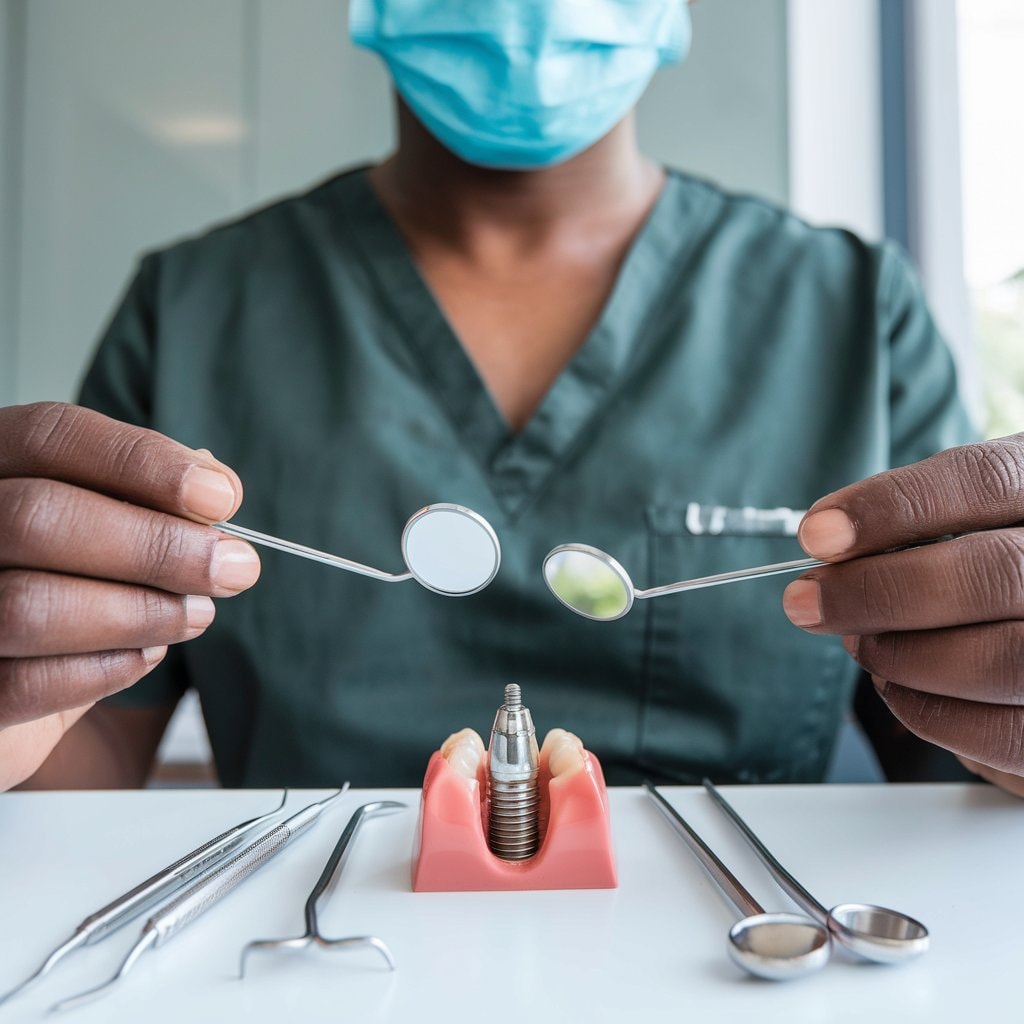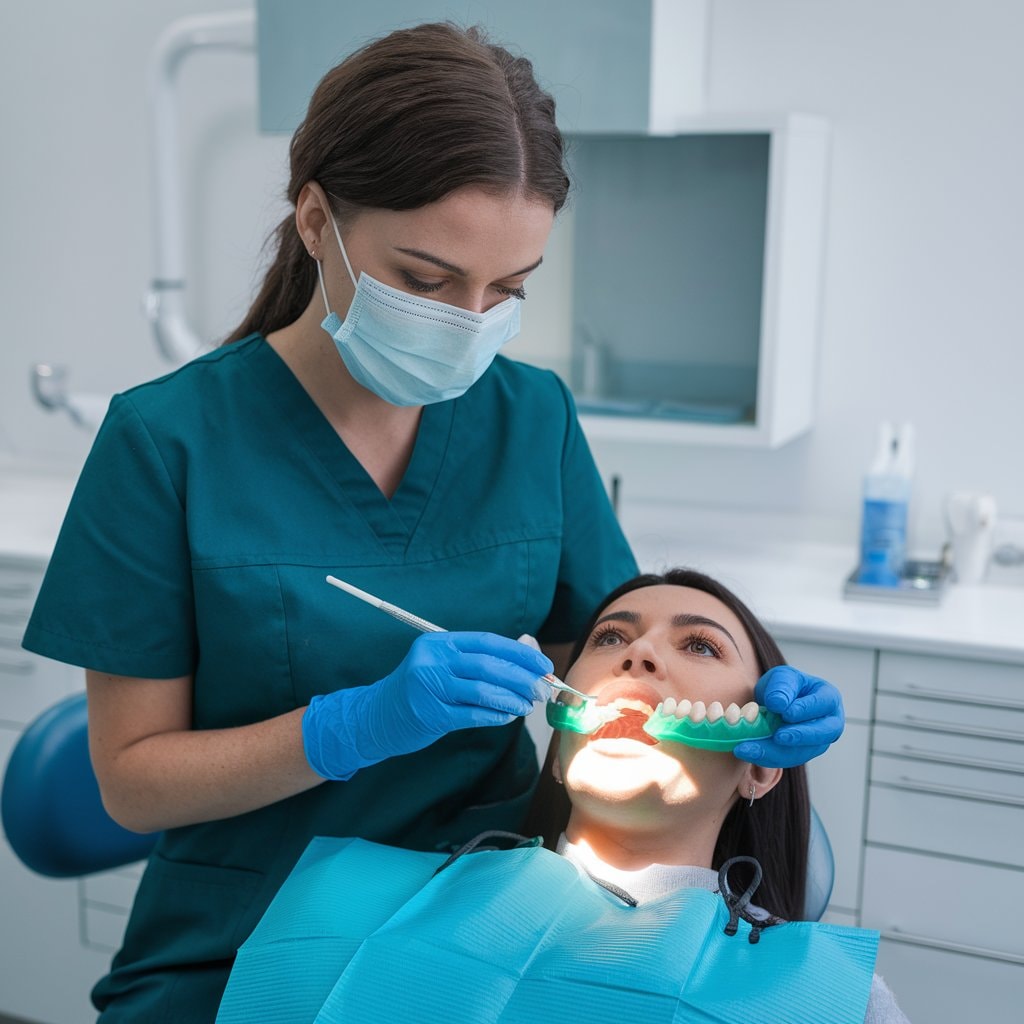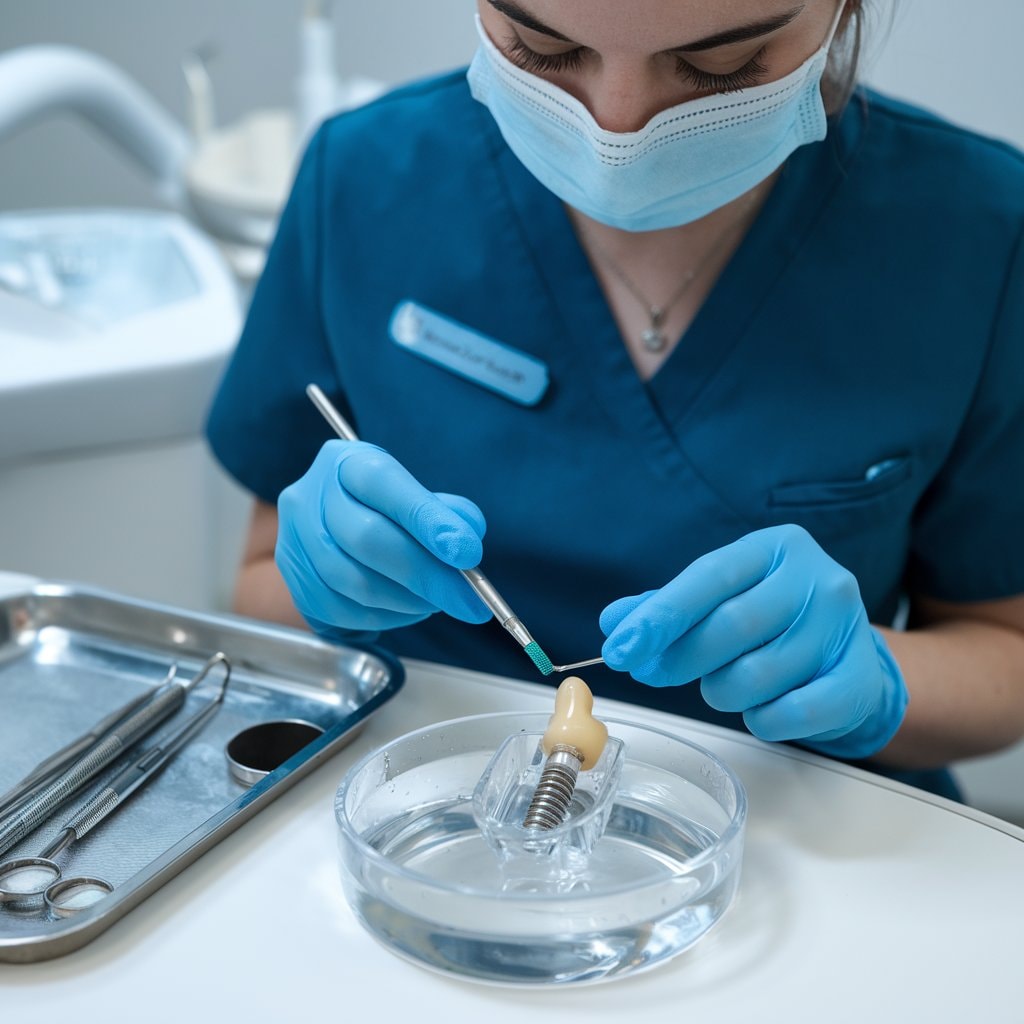Dealing with stains on dental implants can be frustrating. Many people worry that these marks may harm their smile and implant health. Understanding how to remove stains from dental implants is key to maintaining your confidence and oral health.
A fact worth noting is that proper cleaning can prevent most stains and extend the life of your dental implants. This article will show you effective cleaning tips to keep your dental implants looking like new.
Keep reading for helpful advice.
Why is it Important to Clean Your Dental Implants?
Moving from the introduction of dental implants, it’s crucial to emphasize their care. Cleaning your dental implants is just as important as cleaning natural teeth. Dental implant failure and gum disease are real risks that come with poor oral hygiene.
Bacteria can build up around the implant surface and surrounding gum tissue, leading to infections or even bone loss over time.
Good oral hygiene ensures dental implants function properly for years, says Dr Suresh Mohan Kumar.
Stains on dental implants don’t only affect their appearance but can also indicate plaque accumulation, which harms overall oral health. Regular brushing with a soft-bristled toothbrush. Use dental floss or an interdental brush to remove particles stuck in hard-to-reach areas to prevent such issues.
Maintaining good oral hygiene is essential for keeping your gums healthy and ensuring the longevity of your dental implants.
Understanding the Risks of Dental Implant Failure
Dental implant failure is a significant concern for anyone considering or currently using these devices to replace missing teeth. Factors like improper care, infection, and the body’s rejection of the implant can lead to failure.
Infections such as peri-implantitis attack the gum and bone structure around the dental implants, jeopardizing their stability. Maintaining good oral hygiene plays a crucial role in preventing these complications.
Patients must follow a strict oral care routine that includes regular cleaning of dental implants. Neglecting this care can cause bacteria to accumulate around the implant site, leading to gum inflammation and, eventually, bone loss.
Visiting a dental professional regularly ensures early detection of problems that could compromise implant health. Implementing proper care practices helps prolong the life of dental implants, keeping them functioning properly like natural teeth.
How Stains Affect Your Implant Health
Stains on dental implants can signal bad news for your oral health. Just like real teeth, implants accumulate plaque that can lead to gum disease if not cleaned properly. This buildup around your implant crown and along the gum line disrupts the delicate balance of good dental hygiene.
It’s not just a cosmetic issue; it affects the foundation of your implant.
Keeping implants clean helps prevent infections that could compromise their stability. If bacteria gather under the implant crown, they create an environment ripe for problems, including implant failure.
Regular checkups and cleaning dental implants properly are crucial steps to ensure their longevity and function, safeguarding your investment in good dental health.
The Benefits of a Good Oral Hygiene Routine
Maintaining good oral hygiene is essential for everyone, not just those with dental implants. A solid routine prevents tooth decay and keeps your gums healthy. Brushing your teeth twice a day and using dental floss daily can remove food particles that harmful bacteria feed on.
These practices reduce the risk of infections, which can lead to dental implant failure if not properly managed.
A smile is a curve that sets everything straight.
Choosing the right products for dental care also Plays a key role in keeping your mouth clean. Soft-bristled brushes are gentle on both natural teeth and implants, while implant-specific floss effectively cleans around hard-to-reach areas without damaging the surgical site.
Regular professional cleanings by a dentist help maintain good oral health and ensure any potential issues are caught early.
What is the Best Way to Clean Dental Implants?
Cleaning dental implants properly is essential for maintaining good oral health and is crucial for ensuring the long-term health of your implants. Start by using a soft-bristled toothbrush to gently brush around the implant crown twice daily.
This helps in removing plaque without scratching the surface. Incorporate floss designed specifically for implants, such as dental tape or an interdental brush, to get rid of food particles trapped under the gum line and between teeth.
Avoid using abrasive toothpaste that can damage the surface of the implant.
In addition to regular brushing and flossing, consider using a water flosser or oral irrigator equipped with a non-abrasive tip to disrupt and remove bacteria around dental implants efficiently.
Rinsing with an antibacterial mouthwash can provide an additional layer of protection against infection-causing bacteria. For those who have sensitive teeth or are during their initial healing period after getting dental implants, choosing products meant for sensitive mouths is essential to avoid irritation.
These tips on how to clean your dental implants at home will help keep them in top condition and prevent issues that could compromise your oral health.

How to Properly Clean the Implant Surface
Cleaning the implant surface is crucial for maintaining dental health and ensuring the longevity of your dental implants. Proper care prevents infections and keeps your smile bright.
- Use a soft-bristled toothbrush to clean around the dental implant gently. Soft bristles ensure you won’t scratch or damage the surface of your dental implants.
- Incorporate a non-abrasive toothpaste that is gentle on dental implants, avoiding those with harsh ingredients that can cause wear over time.
- Implement interdental brushes for hard-to-reach areas around your implants. These brushes are specially designed to remove food debris and plaque without harming the gums or implant.
- Practice good oral hygiene by brushing your teeth twice a day. Consistent brushing helps remove any remaining particles and prevents staining.
- Opt for flossing daily with implant-specific floss to get rid of food particles between teeth and under the dental crown, protecting against gum disease.
- Rinse with an alcohol-free mouthwash to kill bacteria without causing dryness or irritation in your mouth, which can be beneficial for overall implant health.
- Schedule regular visits with your dentist for professional cleaning. Dentists have specialized tools designed for the thorough cleaning of dental implants.
Taking care of your dental implants properly leads to their lasting success and maintains your oral health. Next, we’ll look at why choosing the right products for dental implant care matters greatly in daily maintenance routines.
Using Dental Floss to Remove Food Particles
After ensuring the surface of your dental implants is clean, focusing on the spaces in between is crucial. Dental floss plays a key role in removing food particles that brushing alone can’t reach.
- Choose implant-specific floss for cleaning around your dental implants properly. This type of floss is designed to be gentle on the gums and implants.
- Slide the floss gently between your teeth and under the gum line, where food particles often hide.
- Use a back-and-forth motion to carefully clean each side of the implant without applying too much force.
- For areas that are hard to reach, consider using a floss threader. This tool helps guide the floss through tight spaces, ensuring no area is left uncleaned.
- Water flossers can be an effective alternative, especially for cleaning all-on-4 dental implants. They use a stream of water to remove food particles and plaque.
- Make cleaning between your teeth with dental floss or water jet part of your daily oral hygiene routine to maintain healthy implants.
- Replace your floss with a fresh piece as you move to new sections to avoid transferring bacteria.
Ensuring you effectively remove food debris from around your dental implants will help keep them in top condition, reducing the risk of implant failure and gum disease.
Should You Brush Your Teeth Twice a Day?
Brushing your teeth twice a day plays a crucial role in keeping both your natural teeth and dental implants clean. This routine helps remove food particles that can lead to plaque buildup, a primary cause of implant failure and gum disease.
For those with dental implants, using a soft-bristled toothbrush ensures you effectively clean hard-to-reach spots without damaging the implant surface. Making this practice part of your daily oral hygiene routine greatly contributes to the longevity of your implants and overall dental health.
Choosing the right time to brush is equally important; once in the morning and again before bedtime ensures that bacteria do not have a chance to multiply while you sleep. Pair this habit with the use of implant-specific floss and regular visits to your dentist, ensuring that your dental implants stay in excellent condition for years.
Keeping up with these simple steps guards against complications and maintains the benefits of dental implants, enhancing both their function and appearance.
How Can You Keep Your Dental Implants Clean at Home?
To keep your dental implants clean at home, start with brushing twice a day using a soft-bristled toothbrush. This helps remove food particles and plaque without scratching the surface of your implants.
Make sure to reach all sides of the implant as well as your natural teeth, aiming for thoroughness rather than speed.
Incorporate flossing into your daily routine, especially using implant-specific floss or bridge floss that can get into those hard-to-reach areas around the implants. Combine this with gentle rinses of water or a mix of water and hydrogen peroxide to kill bacteria and prevent infection.
Opting for electric toothbrushes and dental water jets can also offer deeper cleaning by effectively targeting spots manual tools might miss. Choose products designed for sensitive teeth and gums to ensure you care for your dental implants without causing harm.
Daily Habits to Maintain Good Oral Health
Keeping your oral health in check is essential for managing your dental implants effectively. Here are several daily routines that can assist in keeping your mouth in the best state.
- Brush your teeth twice a day utilizing a brush with soft bristles. This action aids in the removal of plaque and prevents tartar accumulation around implants.
- Implement the use of implant-specific floss to tidy areas that are difficult to reach between your teeth and the implant site. Frequent flossing eliminates food particles that might escape a toothbrush’s reach.
- Use an antimicrobial mouthwash daily to eliminate bacteria and lower plaque levels. This activity contributes an added security level for your dental implants.
- Steer clear of hard and sticky foods that could harm implants or exert needless pressure on them. Choosing soft foods is a safer option that minimizes the risk of damage to the implant.
- Make sure to stay hydrated by drinking enough water throughout the day to assist in rinsing away food remnants and bacteria, thereby promoting saliva generation, which naturally cleanses the mouth.
- Stop smoking since it negatively affects blood circulation to the gums, which weakens the bone structure necessary for dental implants.
- Regularly see your dentist for inspections and professional cleanings designed for dental implant care. Routine appointments enable the early identification and intervention of potential problems.
Adhering to these straightforward yet effective habits will support the preservation of your dental implant’s condition and overall oral health.
Selecting the Best Products for Dental Implant Care
Choosing the ideal dental care supplies is vital for preserving the cleanliness and health of your dental implants. To protect the surface of your implants from scratches, select a toothbrush with delicate bristles.
Regular use of non-abrasive toothpaste, as recommended by your dentist, effectively removes stains without any harm. Dental floss specifically created for implants is instrumental in preventing plaque accumulation as it slides effortlessly around implants and areas that are difficult to clean.
The risk of peri-implant disease is greatly diminished with the steady use of oral hygiene products made for implants.
Incorporating a gentle, alcohol-free mouthwash into your dental routine is also important, as it clears away food scraps while being kind to your gums. This mix of products delivers a thorough care regimen for both your natural teeth and implants, ensuring their durability and steadiness.
Cleaning around the implant daily in a gentle yet effective manner requires a consistent routine, but it is rewarding as it helps maintain a pristine smile. Now, we will discuss how the right brushing techniques can further fortify the health of your dental implants.
Tips on Gently Clean Around the Implant
Cleaning around your dental implant is crucial to maintaining oral health and ensuring the longevity of the implant. Gentle and thorough care prevents damage while keeping the area free from harmful bacteria.
- Opt for a soft-bristled toothbrush to prevent scratching the implant surface. This helps remove plaque without causing harm.
- Implement flossing with implant-specific floss daily. This type of floss is designed to clean hard-to-reach areas around implants effectively.
- Rinse with a non-alcoholic mouthwash twice a day. Alcohol-free options protect the soft tissues in your mouth and help control bacteria around implants.
- Employ a water flosser for an additional cleaning method. Water flossers can reach beneath the gum line, whereas traditional flossers might not.
- Apply baking soda toothpaste gently on the implant area once a week. Baking soda naturally helps in removing stains without being harsh on your implants.
- Schedule regular checkups with your dentist. A professional can identify potential issues early and provide deep cleaning when necessary.
- Avoid using abrasive products like stiff brushes or harsh toothpaste, as they can scratch the surface of your implant.
- Practice brushing at a 45-degree angle to the gum line. This technique ensures that you clean both your natural teeth and around the implant effectively.
- Limit intake of staining foods and beverages. Coffee, tea, red wine, and some fruits can cause staining your implants if consumed frequently.
- Replace toothbrushes or brush heads every three months to maintain effective cleaning power.
Caring for dental implants involves mindful habits and regular maintenance helps prevent issues before they arise. By following these tips, you promote lasting health for your dental implants and overall oral hygiene.
Are There Special Considerations for Cleaning All-on-4 Dental Implants?
All-on-4 dental implants require particular attention to maintain their cleanliness and health. This approach supports a complete arch of teeth with merely four implants. Due to the special arrangement, cleaning around and below the implant bridge is vital.
One should use a gentle toothbrush to reach those difficult places without damaging gums or implants. Dental experts commonly propose the use of implant-specific floss and water flossers to aid in the removal of food residue that may linger beneath the bridge.
For individuals with all-on-4 implants, specialists may advise having more regular dental appointments for comprehensive cleans by your dentist more often. These sessions permit dentists to vigilantly observe the condition of the implants and resolve any problems promptly.
They might also offer expert advice specifically for maintaining the health of all-on-4 implants, securing their durability and avoiding possible complications.

How to Clean All-on-4 Effectively
Cleaning All-on-4 dental implants properly ensures their longevity and maintains your oral health. It’s crucial to follow a dedicated cleaning routine to prevent issues like implant failure or infection. Here’s how you can effectively manage the care of your All-on-4 implants:
- Use a soft-bristled toothbrush to clean around the implant crowns gently. Soft bristles help avoid scratching the surface while removing plaque.
- Implement non-abrasive toothpaste in your daily brushing to keep the implants free from scratches that could harbour bacteria.
- Apply dental floss daily, specially designed for implants, to eliminate food particles and plaque from difficult-to-reach areas between the teeth and under the bridge.
- Rinse with an alcohol-free mouthwash twice a day to reduce bacteria buildup and promote gum health without causing dryness or irritation.
- Include a water flosser in your routine for removing debris from around implants, as it can reach places traditional floss might miss.
- Visits to your dentist regularly for professional cleanings and checkups, ensuring any minor issues are caught early before they become major problems.
- Avoid using hard objects like toothpicks near your implants, which could damage them or push bacteria into sensitive areas.
- Quit smoking as it impairs healing and increases the risk of implant failure due to reduced blood flow in the gums.
Making these practices part of your daily oral hygiene will protect your investment in All-on-4 dental implants. Now, let’s look at when it might be necessary to seek professional cleaning beyond your home care routine.
Common Mistakes in Cleaning All-on-4 Dental Implants
Cleaning All-on-4 dental implants properly is crucial for maintaining oral health and ensuring the longevity of the implants. Many dental patients overlook important steps or make errors that can compromise their implant’s health.
- Skipping professional cleanings: Patients sometimes think daily brushing is enough. Yet, regular dental checkups are key to keeping All-on-4 implants in top shape.
- Ignoring the use of a soft-bristled brush: A hard-bristled brush can damage the surface of All-on-4 implants. Soft bristles clean effectively without scratching.
- Not using implant-specific floss: Regular floss might not remove food particles in hard-to-reach areas around implants. Implant-specific floss does a better job.
- Forgetting to clean all sides of the implant: Some people clean only the front and back, missing the equally important sides.
- Applying too much pressure while cleaning: This mistake can hurt gums and lead to wear on the implants.
- Using abrasive products: Harsh toothpaste or mouthwashes can damage All-on-4 implants over time.
- Neglecting post-operative care instructions: After getting All-on-4 dental implants, following your dentist’s care directions is essential for healing and long-term success.
- Missing regular dental implant checkups: These appointments allow your dental specialist to catch issues early and provide deep cleaning when necessary.
- Overlooking signs of infection or discomfort: Early detection of problems can prevent major complications with All-on-4 dental implants.
- Failing to replace worn-out brushes or floss aids: Old, frayed tools won’t clean effectively and could harbour bacteria.
Anyone with these types of implants needs to review their cleaning habits regularly and adjust as needed to keep their smile bright and healthy.
Professional Recommendations for All-on-4 Implants
Dentists often highlight the importance of special care for All-on-4 dental implants. They advise using a soft-bristled toothbrush to clean all hard-to-reach spots gently. For optimal cleaning, dentists recommend implant-specific floss and interdental brushes to help remove food particles trapped under the bridge.
Regular dental checkups are crucial, they say, as professionals can spot issues early and perform deep cleaning if necessary.
To maintain the health of your All-on-4 implants, choosing the right products is key. Dentists stress on selecting non-abrasive toothpaste to avoid scratching the surface of implants.
They also suggest rinsing with an antimicrobial mouthwash daily to reduce plaque buildup around the implants. Following these steps will ensure your All-on-4 dental implants stay clean and healthy for years.
When Should You Seek Professional Dental Implant Cleaning?
You need a professional dental implant cleaning if you notice your implants don’t look or feel right. Signs like bleeding gums, bad breath, or difficulty chewing could point to problems.
These symptoms suggest that home care might not be enough for your dental implants. Regular dentist visits ensure they assess and properly clean hard-to-reach areas around the implant.
Professional cleaners use special tools designed for dental implants. They can safely remove plaque and tartar without damaging the implant surface. Often, dentists recommend getting these deep cleanings every six months to prevent oral health issues.
This way, you keep your dental implants looking great and functioning well for years to come.
Signs That Indicate You Need a Professional Cleaning
Persistent bad breath or a bad taste in your mouth might signal it’s time for professional dental services. These symptoms often indicate that bacteria have built up around your implants, a problem brushing alone can’t fix.
Redness, swollen gums around the implant, and increased sensitivity also suggest that you may need more than just your routine at-home care. Professional cleaning goes beyond what we can do with our toothbrushes and floss at home; it reaches those hard-to-reach spots to ensure your dental implants stay healthy.
Bleeding when you brush or floss around the implant is another clear sign that professional intervention is necessary. This bleeding can signify gum inflammation caused by plaque build-up not removed during regular oral hygiene practices.
Attending regular cleanings with a dentist ensures any early signs of issues are caught before they evolve into more serious problems requiring complex treatments.
Regular checkups and cleanings are essential for maintaining the health of your dental implants.
Now let’s explore understanding the dental implant procedure for deep cleaning.
Understanding the Dental Implant Procedure for Deep Cleaning
The dental implant procedure for deep cleaning involves several key steps to ensure the longevity and health of your implants. Dentists use specialized tools to clean around and beneath the implant surface without causing damage.
This process helps remove plaque and tartar that can lead to infection or implant failure. It’s crucial for maintaining good oral hygiene, especially in hard-to-reach spots that regular brushing might miss.
During a professional cleaning, dentists often recommend using a soft-bristled toothbrush and implant-specific floss as part of post-operative care. This approach aids in gently cleaning around the implant without scratching its surface.
Regular visits to your dentist play a significant role in dental health maintenance, allowing them to spot any potential issues early on and keep your dental implants regularly cleaned, ensuring they remain healthy and stain-free.

The Role of Your Dentist in Dental Health Maintenance
Your dentist holds a crucial position in preserving the well-being of your dental implants. They employ unique instruments to cleanse difficult-to-reach areas, making sure your implant stays in good shape and devoid of bacteria.
Routine appointments enable them to identify possible problems in advance, averting implant malfunction.
Dentists also provide guidance on optimal products for dental implant maintenance. They can suggest floss exclusive for implants and soft-bristled brushes fit for your requirements.
This advice assists you in keeping your implants clean at your residence, safeguarding your oral health.
Conclusion
Regular care and maintenance are crucial for keeping your dental implants clean and healthy. This includes daily habits like using a soft-bristled toothbrush, implant-specific floss for those inaccessible crevices and cleaning your dental implants often.
Regular appointments with your dentist are necessary to make sure your oral health activities contribute to your implant’s longevity.
Professional teeth cleaning is critical, especially for more intricate implants like all-on-4 dental implants. Your dentist plays an important role in preserving the health of these investments through deep cleaning procedures specifically formulated to prevent implant failure.
They can provide individualized advice on products and techniques optimally suited for maintaining cleanliness in every part of your mouth, ensuring a confident smile that lasts for years to come.


